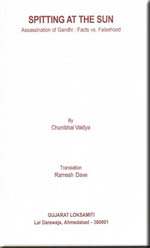
P.O. SEVAGRAM, DIST.WARDHA 442102, MS, INDIA. Phone: 91-7152-284753
FOUNDED BY MAHATMA GANDHI IN 1936
The Spitting At The Sun
[ Assassination of Gandhi : Facts vs. Falsehood ]

SPITTING AT THE SUN
(Assassination of Gandhi :
Facts vs. Falsehood)
Written by :Chunibhai Vaidya
Table of Contents
- Tell The World
- Light Beyond Darkness
- A Word or Two
- Some Points Dealt With In This Book
- Dialogue
- Epilogue
- Appendix 1 : Gandhiji's Speech At The Prayer Meeting
- Appendix 2 : Gandhiji's Speech At The Prayer Meeting
- Appendix 3
- Appendix 4
- Appendix 5
- Charge-Sheet
- About The Author
About This Book
Written by :Chunibhai Vaidya
Translated by :Ramesh Dave
Printed by : Umiya Offset,
Tavdipura,
Ahmedabad - 380 014,
India.
First Published :
November 1998
Printed and Published by :
Gujarat Loksamiti,
Loksamiti Compound
Lal Darwaja,
Ahmedabad - 380 001
Download
Some Points Dealt With In This Book
Chunibhai Vaidya
- The foremost is the freedom of ideas and expression. One might argue that Godse was free to have his own approach and gag Gandhi's utterances, even to eliminate him heinously! But how about the logic of those who misinterpret the ban on a play, based on utter distortion of truth, as a violation of the fundamental freedom of expression, particularly when the sole motive of writing the play was to justify the assassination of one of the greatest men of our age, and cause grave and widespread provocation?
- The chronology of attempts to kill Gandhi.
- So far as the question of crime and punishment is concerned, the state alone has the authority to punish, none else.
- The excuses put forward for assassination are fabricated—patent lies. Even long before there was anywhere a brainwave of partition, there were attempts on Gandhi's life. Why?
- The efforts to bring the Muslims into the mainstream of the nation were there prior even to Gandhi's return home: separate electorates; the part played by the other leaders in securing greater measure of representation for Muslims exceeding their legitimate share etc. Gandhi never took any partisan stand.
- The concept of Pakistan; the open though unconscious support of the Hinduists.
- The ambivalent process of accepting as well as alienating the Muslims.
- A sense of futility and helplessness of the so-called Hindu protagonists in the face of Gandhi's faith in God, religion, humanity, and unity.
- Gandhi's pursuit of integral oneness vs. the reactionary process of the separatist Hinduists.
- A Gobellian move to defame Gandhi and the Indian National Congress: "Repeat a lie a hundred times and people will start taking it as truth."
- The nationalist Mahomedans and the Indian National Congress.
- Mountbatten's ultimatum—a puzzle for the Congress.
- The sense of betrayal—helpless reconciliation with the inevitable.
- An incomprehensible demand of the Hinduists: Why did Gandhi not join hands with the others who were opposed to partition?
- The problem of fifty-five crores of rupees—the rejection of tit for tat policy—the universal moral principle.
- The reason why Gandhi pervaded all over.
- Why was the conspiracy to kill Gandhi hatched? Who was responsible?
- Gandhi's harsh words not merely to the misguided Hindus but also to the Muslims.